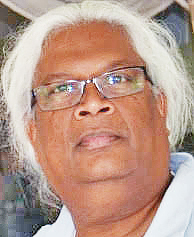Opinions
Babes in the Woods

The partners in the deal to extract oil from Guyana offshore finds announced by Exxon-Mobil (EM) are EM, 45%, Hess 30%, and CNOOC-Nexen Petroleum (a Canadian company sold to China), 25%. Additionally, Eco Atlantic has announced finding almost 3 billion barrels, which it plans to drill in September 2019. All have Guyana subsidiaries.
The host partner is Guyana, which, as I’ve claimed, is a babe-in-the-woods where oil and gas are concerned, and with large international corporations, which easily win by flashing a few big ones.
On the other side, should Guyanese trust these companies, as Granger does? Trust is inevitable, but needs oversight. Assuming the best case for Guyana, where the expected and agreed revenue comes to the country, there is much to fear, and the general population can be so easily bilked by their leaders, especially in a racially conflicted population, where half the population slavishly follows its ethnic leader and will believe anything he says and condone shortcomings. Even when there is no obvious ethnic divide, as in Africa, tribal interests guide behaviours.
The record is awash with cases against oil companies for a range of issues, from civil rights (anti-gay bias), contract defaults to environmental issues. Everyone is familiar with the Exxon Valdez incident, but less aware of the century plus destruction of the Bayway area, New Jersey, wetlands and marshes since Esso’s founding. Sued for $8.9 billion, Exxon settled for $250 million! It paid Chad US$74 billion, the courts ruling that Chad was underpaid in the royalties to which it was entitled and an additional US$819 million in overdue royalties! In 2003, it was ordered to pay Alabama over $100 million in back-pay royalties, and paid the US government $32.2M to settle claims re underpayment of royalties due for mining natural gas from federal and aboriginal lands. In 2009, it was fined $104.7 for contamination of NY City groundwater; other accusations of oil contamination of ground water include concealment by the company; a judge in 2011 awarded $500 million to plaintiffs. A major case of a burst pipeline in Arkansas, destroying a neighbourhood and a lake, suggested that the company overloaded an old pipeline rather than build a new one. Exxon bought 60 houses, and dismantled 20, but all is not settled. There are several other outstanding lawsuits against EM, including a human rights suit brought by a group of Indonesians claiming that EM employees abused, tortured and maimed them; others dealing with air pollution and one for allegedly deceiving shareholders. In 2010, Sierra Club and Environment Texas sought a court order which required EM to end violations against the Clean Air Act. In 2014, USA Today reported that EM CEO and Chairman, Rex Tillerson, joined a lawsuit to stop his company from building a water tower near his Bartonville, Texas home! How ironic. In 2018 a U.S. judge dismissed an EM lawsuit against New York to bar probes into its handling of climate change.
Guyana beware!
Be careful what is said during youth
 Romeo Kaseram
Romeo Kaseram
Ma never stated the following adage with her signature wagging of that crooked forefinger, but now that I have arrived at the age where on some days I find myself speaking in tones of the original after dipping into a resource of wisdom I did not know I had gathered, I say now with the certainty of a “Maism”: “Be careful who you call a witch; it could turn out decades later that she was a close relative all along.” For me to have arrived at this stage in life, where I am now capable of my own “Maism” is stunning; it marks a milestone achievement that would have made Ma proud. I could see her pursing her two, thin lips tightly
together, and turning them downwards into her upside-down frown of approval while placidly nodding her head. And since she has spent most of her afterlife inside my head as my compass and a point of reference on what is right and wrong, I could hear her abstractly murmuring, “The little boy learn his books good. It didn’t feel good at the time, but now I am so glad I put a few lash in his little tail!” However, I recognise I still have a long way to go in gathering enough of the experiences needed to summarise the many hard lessons that remain ahead of me. It is still a long road ahead before I could distill these experiences into the pithy, instructional, and eternal sayings Ma constantly leveraged into our daily lives when she was not futilely blowing into a reluctant fireside, or belabouring the dirt out of laundry on sharp rocks.
Of course, many of these were part of a wider community repository of child-raising tools, a collective of directives reduced to distillations mostly about the hazards of life, easily recalled summaries of the many lived joys and sorrows experienced in those hard and gruelling days among the cane fields back home.
Ma deployed quite a few in her days, mostly targeted in my direction since I was a badly-behaved young boy: “Child, you over harden! I telling you over and over: friends carry you but they don’t bring you back!” Then there was the famous warning, “Little boy, I fed up preaching like Moses: the sea have no branch!”
Unique to her, and a true “Maism”, was her warning that a flood of punishment was coming down, the river about to overflow its banks: “Child! Don’t let the devil take me here today!”; there was also another warning, “Little boy! You keep up with that behaviour, and I will let you know what o’clock it is!”
And so it has come to pass that today I am looking back at my days of youth, searching out the memories where I conflicted with an irascible neighbour who kept our cricket balls whenever it landed in her backyard; or if she returned it, did so with an incision made with a knife. For her meanness in keeping our cricket balls, and for her occasional spurts of generosity in returning them pierced and so unusable, she earned the dark nickname of “The Witch”.
Instead of making peace with her, we taunted the old woman. At night a few of the more mischievous boys in our group threw large rocks on her roof. These rocks remained on the roof even as I grew into a young man, a reminder of our anger and rage at her behaviour. And now today, I wonder about these intransigent young boys among us: what kind of men did they grow up to become? An even more pertinent question lingers: who resides inside their heads as afterlives and compasses, guiding them through the tumult, the unpredictability, the agonies and disappointments of adulthood?
Looking back now, I wonder why we confronted her with the belligerence and hostility of the pack, rather than reach out to her with concern and kindness. All the signs were there of her enduring an interminable sorrow – the neglect of the house, overgrowth in the front and backyards, her reclusive lifestyle. Yet we remained belligerent and hostile; even as young boys, we wanted to bend her to our will, shouting her down and demanding she return our cricket balls.
It was during a recent chat with a family member where the memory of this reclusive woman was recalled. Summoned out of the past, she returned to the present, to be renewed and enfolded among us as a family member who had suffered a terrible trauma, and had consequently withdrawn from the world and its cruelty.
Yes, she punished us all for her suffering, treating us harshly for the tumult, unpredictability, agonies, and the disappointments she had endured. For such a response, we labeled her “The Witch”.
My first “Maism” ever in this life has not left me celebrating its ascension; instead, it has left me unable to expiate the interminable sorrow I feel over such bad boyhood behaviour: “Be careful who you call a witch; it could turn out decades later that she was a close relative all along.”
